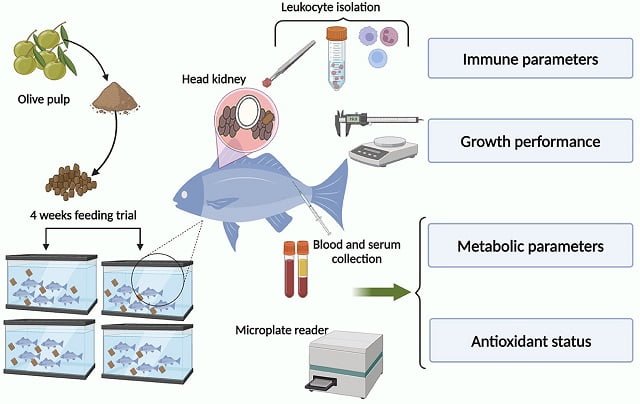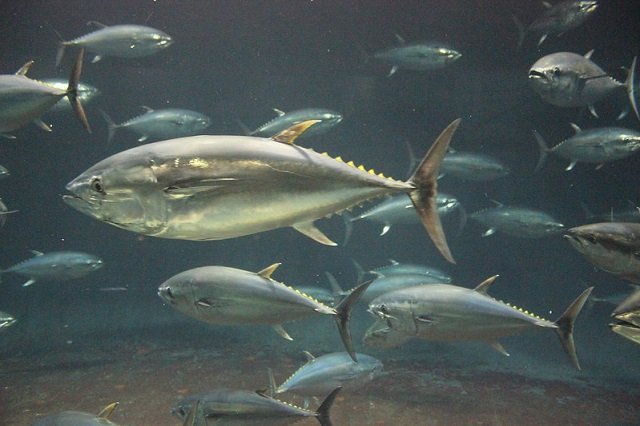
The thriving gilt-head bream aquaculture industry faces a crucial challenge: developing high-quality, low-cost feed. This article explores the intriguing potential of olive pulp (OP) as a natural and sustainable supplement for gilt-head bream, a commercially vital fish in the Mediterranean.
A new study explores a promising alternative: olive pulp. Yes, the byproduct from olive oil production! This new study, conducted by scientists from the United Arab Emirates University and the University of Murcia (Spain), aimed to evaluate the effect of dietary administration of olive pulp (Olea europaea) on the growth rate, metabolic profile, serum antioxidant potential, and innate humoral and cellular immune parameters of gilt-head bream (Sparus aurata L.), a commercially important fish species in the Mediterranean.
Natural Alternatives
The answer lies in natural alternatives. Research suggests that natural immunostimulants, such as those found in plants, can effectively replace antibiotics and chemotherapeutics in aquaculture. These plant-derived solutions come with several advantages:
- Safety: Natural immunostimulants are generally safer for fish and pose no environmental risks.
- Cost-effective effectiveness: Often locally available, they offer a competitive cost advantage.
- Biodegradability: They readily decompose, minimizing environmental impact.
- Immune system stimulation: Studies demonstrate they can strengthen fish immune response, combating diseases and promoting overall health.
- Antioxidant power: Many plant-derived supplements possess potent antioxidant properties that protect fish cells from damage.
The Mediterranean Star: The Olive Tree
The humble olive, a staple of the Mediterranean diet, holds immense potential for aquaculture. Studies have shown that olive pomace, a byproduct of olive oil production, can be a valuable nutrient source for various animals, including birds and fish. However, research on the specific use of olive pulp in fish feed remains limited.
This article delves into a new study investigating the impact of incorporating olive pulp (OP) into gilt-head bream diet. Researchers attempted to assess the effects of different levels of OP inclusion in fish:
- Growth performance: How well fish grow in terms of weight and size.
- Metabolic parameters: Indicators of overall health and physiological functioning of the fish.
- Antioxidant status: Fish’s ability to combat cellular damage caused by free radicals.
- Immune response: Efficacy of both humoral (antibody-based) and cellular immune system.
The Power of Olive Pulp
Scientists investigated the effects of including different levels of olive pulp (50 mg/kg, 100 mg/kg, and 200 mg/kg) in gilt-head bream diet. Fish were fed these diets for four weeks, and then researchers examined various health parameters. Here’s what they found:
- Improved growth: Fish fed the highest level of olive pulp showed the best growth rates.
- Enhanced antioxidant potential: Olive pulp appeared to increase fish’s natural antioxidant defenses, potentially aiding them in combating harmful free radicals.
- Immune system benefits: While some immunological parameters decreased at the lowest level of olive pulp, others, such as complement hemolytic activity, increased at higher levels. Additionally, higher olive pulp inclusion boosted the activity of white blood cells involved in phagocytosis, a key function of the immune system.
Optimal dosage
Interestingly, the most significant benefits were not observed with the highest olive pulp inclusion. The 100 mg/kg feed level seemed to be the optimal point, as it improved both growth and specific immunological parameters.
Overall, these findings suggest that olive pulp has the potential to be a valuable dietary supplement for gilt-head bream, promoting growth, antioxidant defenses, and some aspects of the immune system.
Conclusion
“The present study showed the positive effects of dietary intake of OP on growth performance, metabolic parameters, antioxidant, and immune status in gilt-head bream,” conclude the scientists.
Stay Always Informed
Join our communities to instantly receive the most important news, reports, and analysis from the aquaculture industry.
The use of olive pulp as a natural immunostimulant holds great promise for the future of sustainable aquaculture. This byproduct, readily available and environmentally friendly, could contribute to healthier fish, reduce reliance on antibiotics, and create a more environmentally responsible industry.
The study was funded by the Seneca Foundation of the Region of Murcia and the Research Center (National Water and Energy Center, UAEU) of the United Arab Emirates.
Reference (open access)
Bahi, A., Bhaskaracharya, R., Esteban, M. A., & Guardiola, F. A. (2024). Dietary administration impact of olive pulp on growth performance, metabolic profile, immune status, and antioxidant potential of gilthead seabream (Sparus aurata L.). Frontiers in Sustainable Food Systems, 8, 1395436. https://doi.org/10.3389/fsufs.2024.1395436
Editor at the digital magazine AquaHoy. He holds a degree in Aquaculture Biology from the National University of Santa (UNS) and a Master’s degree in Science and Innovation Management from the Polytechnic University of Valencia, with postgraduate diplomas in Business Innovation and Innovation Management. He possesses extensive experience in the aquaculture and fisheries sector, having led the Fisheries Innovation Unit of the National Program for Innovation in Fisheries and Aquaculture (PNIPA). He has served as a senior consultant in technology watch, an innovation project formulator and advisor, and a lecturer at UNS. He is a member of the Peruvian College of Biologists and was recognized by the World Aquaculture Society (WAS) in 2016 for his contribution to aquaculture.







